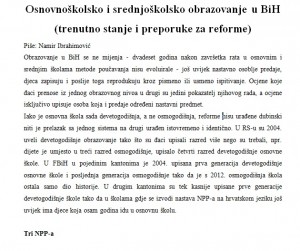 Author: Namir Ibrahimović
Author: Namir Ibrahimović
Education in Bosnia and Herzegovina is at a stand still – twenty years after the war, teaching methods in primary and secondary schools have not evolved. Teaching staff continues to teach, students write down and afterwards reproduce through written or oral exams. Grades that students carry from one education level into another are the only indicator of their performance, and students are graded exclusively by the teacher that teaches a particular subject.
Although primary education lasts nine years now, instead of eight years, reforms neither have been implemented thoroughly, nor has the change of systems been done simultaneously and identically. In 2004 in the Republic of Srpska, nine-year primary education had been introduced in such a way that students enrolled in a higher grade than it was required, for instance, a pupil was enrolled in the fourth grade of the nine-year primary school, instead of the third grade of the eight-year primary school. In some cantons of the Federation of Bosnia and Herzegovina first generation of the nine-year primary school was enrolled in 2004 as well as the last generation of the eight-year primary school, thus in 2012 the eight-year primary school became a matter of the past. In other cantons first generations of the nine-year primary school were enrolled somewhat later, thus in schools that conduct class according to the Croatian-language curriculum there are still children that attend the eight-year primary school.
Text is available HERE.